Knight has been at his new home for one week now and we’ve had some highs and lows. But mostly highs.
1. A New Horse BFF. I was told today by Knight’s neighbor’s mum (I’m saying “mum” because they’re Canadian) that when she comes out, she sees the two horses with their heads resting over each other’s necks. When I returned Knight to his stall on Sunday night his new friend nickered to him.
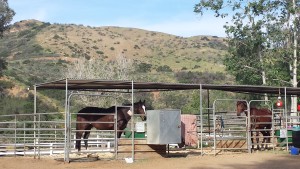
A new friend. Next door is another TB gelding.
2. Excellent first ride in the new arena. I had an amazing riding lesson last Monday. Knight’s canter departures are getting more precise and we jumped over some small verticals and he took them in stride. I was only mildly worried I would be launched into the air. He is very conscientious about not hitting the rails so he jumps very high. On one of them I did ask if he jumped the standard. My trainer said no. Talk about scope! It’s very exhilarating.
3. Peacock Dressage. This one has quite the extended trot.
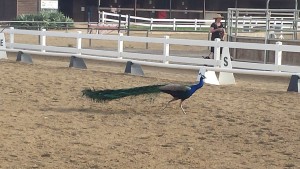
4. Crossties! My last barn did not have them and the hitching post I used that was next to my tack locker was in the blazing afternoon sun. These crossties are in a shady spot.
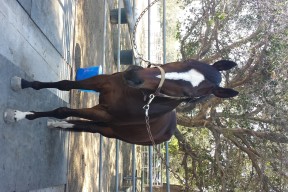
And now for the lows:
1. Knight looks really, really skinny to me (like he’s lost weight in one week). So skinny I don’t really want to show you a picture of him at a certain angle. Let’s just say when I turned him out and the sun was glistening down on his coat, I could count every rib. So apparently what the new place views as a serving of hay is not the same as the old place. A solvable problem, but not fun. I see some rice bran in his future. And more $$$ being shelled out in mine. There is a “feed surcharge” that you pay for your horse to get fed and it goes up depending on how much you have your horse fed.
I long for the Midwest with one flat fee for board which includes turnout (actual pastures with grass!), shavings, feeding, and stall cleaning. This SoCal approach to paying for everything ala carte is going to be the end of me. Yes, I have to pay for my own shavings.
2. My Thursday lesson was not awesome. And the horse did nothing wrong. My brain was my enemy and the same short-end-of the arena quick approach to the end fence (I don’t know what it’s technically called) was getting the best of me. I couldn’t come off the rail and arrive at a nice angle.
Keep in mind, this fence was all of two feet (small enough to walk over in his sleep) and we had jumped it magnificently on Monday when Knight had had two days off prior due to the move. Something about me thinking he was galloping toward it and I was trying to contain him. The assistant trainer said, “He’s not going that fast.” I was micromanaging my horse and in the end my brain was all over the place. So much so that instead of raising fences, I actually said, “Can you make it an X again?”
Part of it is I feel like I’m catching so much air when he’s jumping that I feel vulnerable that post jump/landing stride. As the assistant trainer said, “He’s really a gentleman,” meaning that even though I’m a little discombobulated from time to time, he’s not taking advantage of the situation and throwing in a buck or uber happy playful stride (my last horse would have definitely been playing a bit after the fences).
I’m not a trainer, but I feel like I need to assign us both gridwork. Just seems like the right thing to do.
3. Today I got another one of those trainer voice mails. I abandoned my phone in the garage as horse husband and I were installing a small garden fence to keep the dogs away from our future bumper crop of tomatoes and pumpkins and maybe even blueberries! So I didn’t pick up the message until hours later! By then everything was okay, but here’s what happened.
Knight lay down a couple of times and left his alfalfa half-way eaten. My trainer has a friend who’s a vet tech. She called her and learned that there have been many calls like that lately and they think it’s the weather and the horses aren’t drinking enough. It’s cooler–like in the 70s, instead of last week’s 90s. Maybe they don’t think they’re as thirsty as they are. I know my husband and I weren’t drinking water either even though we worked in the sun all afternoon. #Stupid
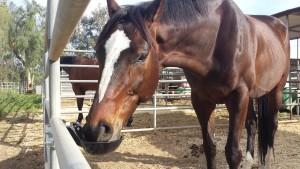
Slurp, slurp.
Last weekend Knight took to his new waterer like a duck takes to water. I think he likes it; however, my trainer gave him some electrolytes today and put an actual bucket of water in his stall so we can monitor how much he’s actually drinking.
I went to see him late afternoon and he was his silly, skinny self. No riding due to his tummy ache or whatever afflicted him earlier Sunday, but that’s alright. I got to groom him and clean my bridle and get to know his neighbor’s mum a bit more. So I guess I have a new barn friend too. So that is High #5!
Comments are awesome! Especially advice on putting weight on a horse without breaking the piggy bank! Hay is super expensive here in CA I think because of the drought??? What are your thoughts?
If you haven’t liked our Facebook page yet, kindly consider doing so. Follow us on Instagram as well. And if you’re a Twitter fiend, I’m pretty active too. My handle is @saddlseekshorse. Knight will have his own Twitter handle once he learns how to use his hooves to type.
Subscribe to Saddle Seeks Horse to ride along with us!

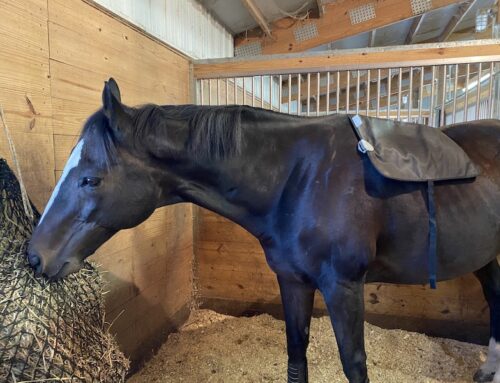
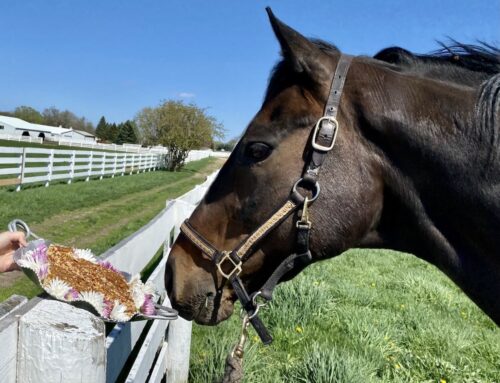
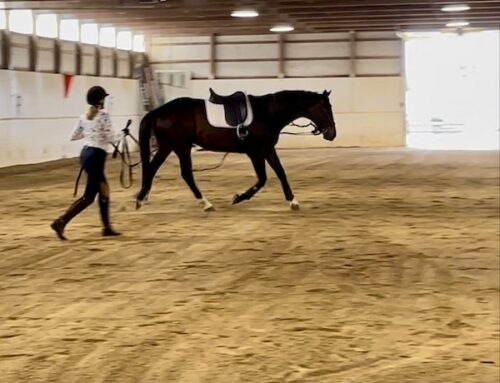
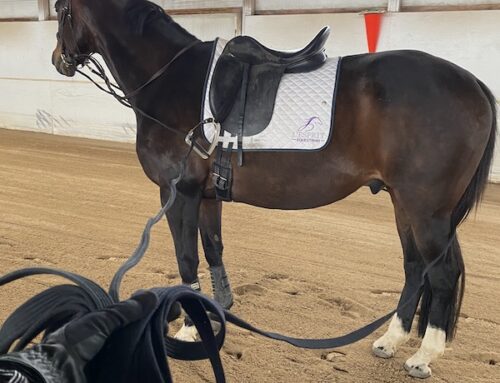
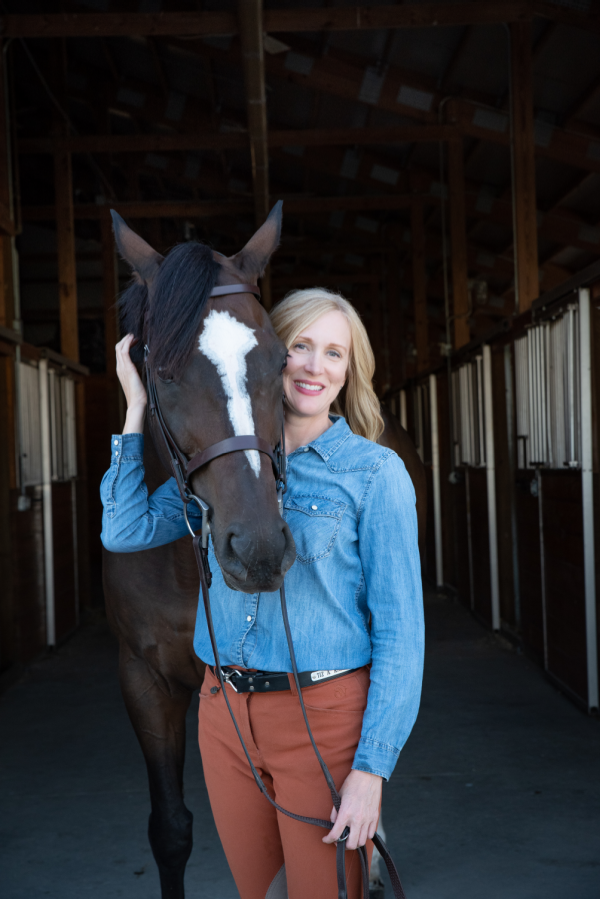

You pay for everything separately? How strange! But glad Knight is feeling better :).
Not sure how it is out there, but here we use beet pulp to put on weight. I am not a fan of oil, but people use that a lot, too. I much prefer more forage though and beet pulp is pretty cheap and does the job!
Thank you! He’s on beet pulp but I think I need to add rice bran. Why don’t you like the oil? I remember my last horse got corn oil for a while.
For one, feeding a high fat diet can lead to IR and laminitis. For two, as with humans, they aren’t healthy for horses. “Adding fat to a horse’s diet seems simple enough, however a horse’s natural diet of fresh grass is very low in
fat, and the only actual “requirement” they have is for fatty acids they cannot manufacture themselves, these
are the omega-3 and omega-6 fatty acids. These are referred to as the Essential Fatty Acids (EFAs). Dr.
Kellon explained that if we were going to supplement fat, we might as well do it in as healthful a way as
possible and make sure we were feeding Doc “good” fats.
Stabilized fats are oils you buy on a store shelf, and oils added to feeds, weight gain products, added rice
brans are all stabilized and have the EFAs destroyed. Stabilization can also change the structure of fats,
producing hydrogenated or partially hydrogenated forms, and trans fats. Stabilized/trans fats have been
recognized as a health risk in Europe for decades (including in relation to heart disease, diabetes/IR), and the
FDA is finally getting around to requiring label information on human foods. These fats are not in a natural
form and Dr. Kellon did not recommend them for Doc. I call these “bad” fats.”
http://shotgunranch.me/PSSMandaQuarterhorsenamedDoc.pdf
For one, feeding a high fat diet can lead to IR and laminitis. For two, it isn’t healthy for horses in the same way eating oil to gain weight isn’t healthy for humans.
“Adding fat to a horse’s diet seems simple enough, however a horse’s natural diet of fresh grass is very low in fat, and the only actual “requirement” they have is for fatty acids they cannot manufacture themselves, these are the omega-3 and omega-6 fatty acids. These are referred to as the Essential Fatty Acids (EFAs). Dr. Kellon explained that if we were going to supplement fat, we might as well do it in as healthful a way as possible and make sure we were feeding Doc “good” fats.
Stabilized fats are oils you buy on a store shelf, and oils added to feeds, weight gain products, added rice brans are all stabilized and have the EFAs destroyed. Stabilization can also change the structure of fats, producing hydrogenated or partially hydrogenated forms, and trans fats. Stabilized/trans fats have been recognized as a health risk in Europe for decades (including in relation to heart disease, diabetes/IR), and the FDA is finally getting around to requiring label information on human foods. These fats are not in a natural form and Dr. Kellon did not recommend them for Doc. I call these “bad” fats.”
http://shotgunranch.me/PSSMandaQuarterhorsenamedDoc.pdf
I would monitor the weight loss, it could be due to a bit of anxiety with his change of home, we had a thoroughbred and the slightest bit of stress and I swear you could see the weight falling off her
That’s a good point. He sure doesn’t seemed stressed because his personality it laid back, but maybe he is stressed because of the change.
When we sold our other horse a couple of weeks ago Skye showed no outward signs of stress but we did notice a change in her eating and drinking habits, all settled down now and she seems even more relaxed now she has all of our attention
Is he a hard keeper in the best of circumstances? Simon never got fat until he basically got free choice hay during turnout and a GENEROUS helping when he’s in his stall during the day. Not a fun situation to be in… I feel for you. Might want to consider adding a weight gain supplement as well?
I feel like I haven’t had him long enough to know if he’s a hard keeper or I just haven’t nailed the proper feeding regimen yet. My guess is hard keeper. I did look up some weight gain supplements on SmartPak. Good idea. I should probably just give one of them a shot.
If it’s any consolation, your trainer probably got almost as big a fright as you did. I was nursing a client horse yesterday night and reminded again of the fact that I get more attached than I intend to. Luckily the client wasn’t around to see me holding the horse’s head in my lap and praying tremulously (and I don’t even get along with the horse very well).
All is well, however. It had much the same tummy achy thing as Knight did – back to its bad-attitude self today, much to my relief.
I love that you also pray for the horses! I feel like we’re kindred spirits! Glad your cantankerous guy pulled through.
My TB was a nightmare to put weight on, but lately he’s been gaining ground. 2 big flakes in the am, safe choice + flax seed + Smartpak’s SmartGut + a big scoop of alfalfa cubes whenever I’m there, and 3 flakes at night. Do I know what exactly is working? Nope.
Thanks for the info, Kate. Knight’s been on SmartGut for a few months. What is Safe Choice? And how much flax seed do you use?
As a California newbie I have started to look into horse areas outside of Santa Monica. The price of hay is definitely alarming. Hopefully Knight will put more weight once he is settled as well. I have never had a horse with weight loss issues (the opposite) so keep us posted on what you try.
That’s right, newbie! Welcome. I think I heard a bale is around $23. I don’t know what it is in the Midwest anymore, but I remember buying it for $3 a bale back in the day. I will definitely keep you posted. If you’re ever down in the OC, you should drop by! 🙂 Knight would love to say hi.
I personally stay away from rice bran. I know a lot of people swear by it and that it does have fat in it, but it has made so many horses I know crazy/hot/reactive and some of them nigh-on unrideable. Instead, I use rolled barley and a top-dressing of canola (sunflower seed) oil to keep weight on Murray. This winter it has worked PERFECTLY, and he’s in increased work AND he’s been on hay strike every since the grass came in (No, I won’t eat my dinner because in a few hours I’ll be turned out in a magnificent pasture that tastes much better). Barley and oil are cheap! ($17 for a 70lb bag up here, $20 for 3 gallons of oil at Costco) and I have never, NEVER seen a horse go crazy on rolled barley. Other feeds people I know have tried are Ultium (can also add a lot of energy with mixed reactions by horse), cool calories (essentially dehydrated oil, means you don’t have to mix your feed every day but is expensive), omega horseshine (flax seeds add fat, about $45 for a six month supply at the recommended dose, is great for feet and coats but doesn’t add a TON of calories) and senior (can go either way).
If you do go the oil route, start low (like 1-2 tbs) and work up to as much as a cup over the course of a month. Murray doesn’t love it, so I make sure to mix it in well and wet down his feed so it’s less detectable.
Since you just moved, maybe also think about treating for ulcers? Big changes = huge ulcer risk.
I feel your pain. Cosmo is not an easy keeper, although he is happy to eat anything, he just doesn’t put on a lot of weight (although I am hopeful that being back in full work might help). We are slowly getting there with some rice bran and beet pulp. I have thought about a weight gain supplement, but I’m not ready to add more expense yet.
At Seabreeze food was unlimited. They were great about throwing him an extra flake at last call since he looked thin. They also did not charge for shavings, it was all one large bill 🙂 Now I do it all myself and it adds up.
the highs sounds pretty good – tho the lows are kinda a bummer too. sorry about the tough ride – it’s especially rough having one right after such a bit change… but next time will be better 🙂
Yeast. Horse version not grocery store.
I’m so pleased Knight has a new friend 🙂 it’s one of the good things about your California setup, I think – the fact that the stalls are just metal railings mean he has maximum opportunity for socialisation, rather than being blocked up in his own box and unable to see anyone else.
With regard to the cost of things, that sort of stuff varies massively from yard to yard (barn to barn ;)) over here too: it’s not something I’ve ever directly experienced, having not yet owned a horse, but being part of the community I still hear stories. I read a great article a year or two ago about how, when we started squeaking out of the recession that yards were putting whistles and bells on everything to keep customers (we’ve gone through a period of animal charities being overwhelmed with horses being given to them, as owners couldn’t afford to keep them and weren’t able to sell them either) – the market got very competitive for livery yards, so some were getting really flashy and offered amazing common room type spaces for owners to hang out in, with comfy furniture, kitchen facilities and things like free wi-fi, so that they could use the yard as their home office in order to do their day job AND spend time with their horse (and also be at the yard to have and pay for riding lessons ;)). But back to the standard… generally, there’s a compromise: yards will either throw everything in to your package (and you’ll pay fairly highly for the privilege), or they’ll charge a bare minimum for basic stable rent and add everything else on top (feed, bedding, a fee if you want them to turn your horse out, change his rugs and bring him in etc etc). Did you see Susy’s latest blog post? She’s funnily enough just posted on a similar theme.
I have no advice on keeping some weight on Knight 🙁 cookies? Pizza? Wine? Sitting on the sofa and marathoning a box set? Those things normally add a few pounds to me, not sure it’s such a good idea for a horse 😉
I think the jumping will come, and that you have to be less hard on yourself 🙂 you and your horse are still getting used to each other, and try and keep this sentiment uppermost in your mind (I feel like I’m going to be telling myself and everyone else this for the rest of my life): your horse is your hobby, ENJOY HIM. It’s supposed to be fun, so make sure it is. You don’t have to (and shouldn’t) do anything that makes you miserable. It will all get there at the right time. It costs you a lot of money, takes up a lot of your time and should therefore be minimally stressful and about maximum pleasure 🙂 lecture over 😉 homework: go and enjoy your horse.
Knight is so cute! I love his big blaze-face. I don’t have any suggestions as far as weight gain… I just added more hay for Miles! I do feel like it’s a bit of a trial & error process to see what works for him and doesn’t make him too hot/reactive.
Of my 4, my Palomino is my hardest keeper. Aside from free choice hay (I am in an area where I pay $.087/lb though, so free choice is cheap and easy), she gets a beet pulp/ground flax mixture. Started that before winter hit hard (we get -35*C rather often) to bulk her up and make sure she had energy to grow her winter coat.
I tried using oil, but she wasn’t keeping the weight as well as I would have liked, nor was her coat as nice as I would have liked. Flax was recommended to me by the stable manager where my DD takes lessons. All 4 are on it…1/2 cup of ground flax/day.
My Pally picked up the weight she needed, her winter coat was silky smooth and fluffy, and hooves! Oh my…the flax has done *everyone’s* hooves good.
Knight is a beautiful boy. 🙂 Hope you get his weight issues figured out quick and easy.
Sorry he is loosing a bit of weight at the new place. It all sounds like a big improvement with the barn and the setting around it though! How fun!
I’m sure you can get him up to a good weight. Sorry you’re having to pay extra for feedings… 🙁
How about just paying for 1x of graining per day, and then each time you go out there, feeding him two smaller portions during the time your’re there?
Do some reading, both the oil and rice bran as others have commented on are viable options. They both have their pros and cons. Myself, I use about 1.5 lbs of beet pulp (moderately soaked for just 1 hr) as well as around 2 lbs of rice bran (Empower Boost is THE highest calorie value for Rice Bran, expensive, but a good head start if only for 1 bag). All spread out in about 3 x feedings per day, along with 1 lb Ratio Balancer, hay, plus grass grazing.
As I’m getting near the ideal weight, I am now cutting down on the rice bran, probably ending up with less than 1 lb/day eventually, if my mare keeps condition.
The beet pulp is good, because of the digestive properties. It is worth around 1.5 lbs of hay calorie wise, for each 1 lb of dry beet pulp measured out. Good luck 🙂